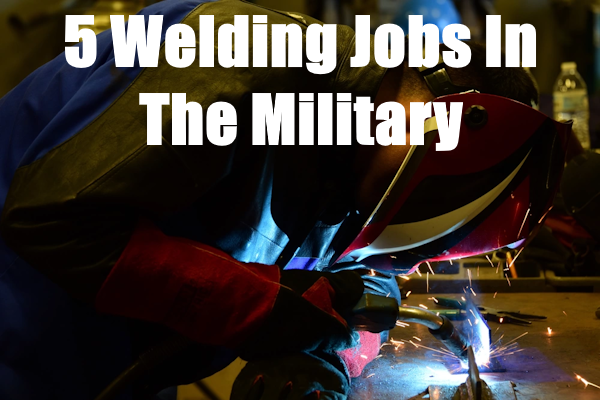Welding jobs in the military are plentiful.
In fact, every major branch of the U.S. Armed Forces offers welding opportunities.
Accordingly, becoming a welder in the military is a terrific career choice.
There are many opportunities for career advancement and promotions, along with steady pay.
Learn more about the different welding jobs in the military, below.
Related Article – Military Support Welder: 10 Things You Need To Know
Table of Contents
5 Welding Jobs In The Military
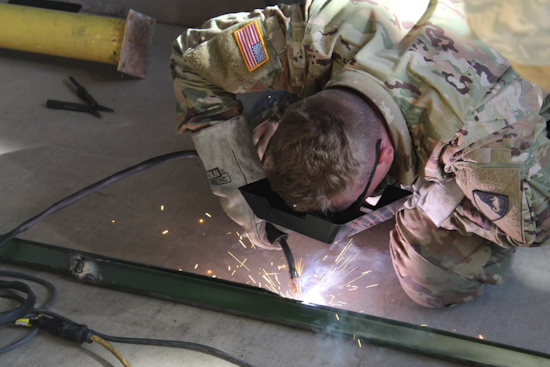
There are many different welding jobs in the various branches of military service.
The military needs to fill many different construction positions ranging from basic labor to skilled trade jobs.
For this reason, welders are among the highest in demand given the massive amount of metal used by the U.S. Armed Forces.
Therefore, welders and other types of metal workers are involved in multiple areas of the military.
Military Support Welders shape, braze, solder, and form metals in various construction projects.
Welders install sheet metal products (air ducts, gutters, roofs, vents, etc.) as well as build custom projects for buildings, ships, tanks, and submarines.
They operate on automobiles, electronics, aeronautics, medical equipment, and other advanced technology.
Today, there are many opportunities to serve the country as a military welder.
These include opportunities in the following service branches:
- U.S. Army
- Air Force / Space Force
- Coast Guard
- Marine Corps (USMC)
- United States Navy
Furthermore, there are several specialty welding jobs within each service branch.
These manufacturing and construction jobs are abundant and available to those willing to work hard and commit time and service to the military.
Military Support Welders perform various welding tasks in all weather conditions and under stress and pressure, in a fast-paced work environment.
Therefore, it helps to become familiar with all the different welding jobs in the military.
Learn more about each welding job in the military including the basic responsibilities and training required:
#1. Army Allied Trade Specialist (MOS 91E)
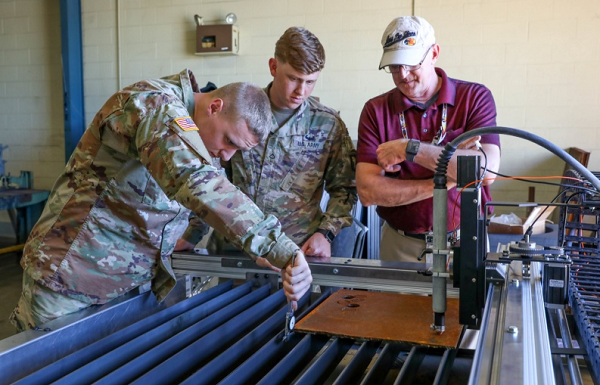
The United States Army is one of several branches that have welding jobs in the military.
In general, the military branch refers to these individuals as Army Allied Trade Specialists (MOS 91E).
Today, Army MOS 91E is a combination of 2 previous military occupations – that of A) Machinist and B) Welder.
Therefore, Army Allied Trade Specialists perform welding tasks among other metal fabrication and repair work.
Army Allied Trade Specialists are skilled in using a variety of hand and power tools, including advanced welding techniques.
Military Support Welders like MOS 91E are responsible for welding and fabricating metal parts and equipment for aircraft, vehicles, and ships.
They also may be assigned to repair damaged equipment or military vehicles.
Army welders typically perform job duties in repair or fabrication shops.
However, they also may be assigned to work outside or on the battlefield.
Army Allied Trade Specialists must work under immense stress and pressure in a very fast-paced environment.
Sometimes this means fixing holes in tanks or constructing bridges for infantry divisions.
Related Article – Navy Diver (ND): Career Details
#2. Air Force / Space Force Support Welder
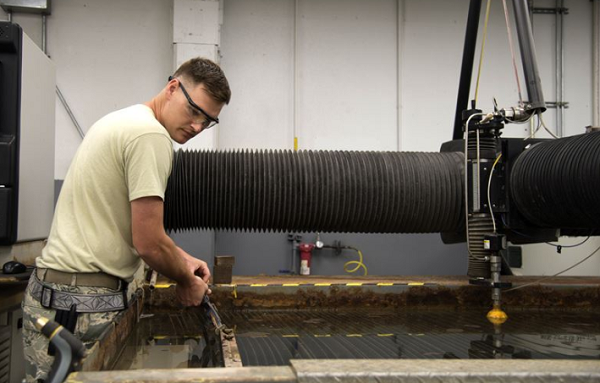
The U.S. Air Force refers to its welders as Aircraft Metals Technology Specialists (2A7X1).
These military personnel are metal fabricators and welders trained to work on aircraft, equipment, and parts.
Air Force 2A7X1 Welders must troubleshoot and repair damaged aircraft and associated parts.
It’s imperative that the aircraft is in full working order in order to avoid any grave mistakes or accidents.
In general, Air Force welders perform similar duties as Army welders, with a bigger emphasis on aeronautics.
So, if you are interested in working in the field of aviation, this is definitely a welding job in the military worth considering.
Welding in the military is a very demanding and high-pressured occupation.
Nonetheless, being a Military Support Welder takes you all around the world and introduces specialists to new challenges.
It’s also anticipated that the U.S. Space Force will add a welding Specialty Code in the future.
For now, USAF welders may perform job duties for both service branches.
#3. Coast Guard Support Welder
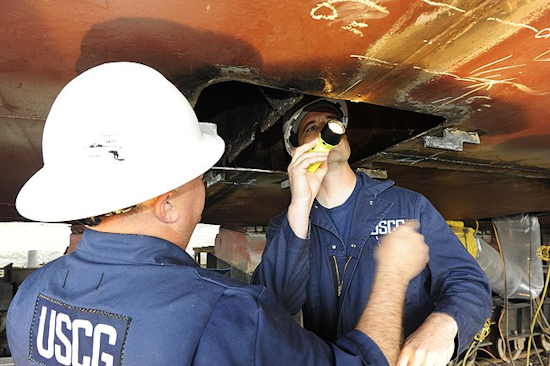
The United States Coast Guard has far fewer job ratings (military jobs) compared to other service branches.
Nevertheless, the Coast Guard does employ welders.
Coast Guard Support Welders perform construction and manufacturing jobs for the service branch.
The Coast Guard has a need for welders and metal fabrication like any military branch.
As such, construction takes place at domestic military facilities and aboard vessels.
Coast Guard welders commonly work on boats and ships, along with shore stations and various aircraft.
So, the job duties can be vast and offer multiple ways to specialize in a certain type of welding or job function.
The best avenue for aspiring welders in the Coast Guard is Damage Controlman.
These military personnel perform most of the hands-on fabrication work in the Coast Guard.
As a result, you’ll also develop plumbing and carpentry skills in addition to welding and fabrication.
Related Article – Army Plumber (MOS 12K): Career Details
#4. Marine Corps Support Welder
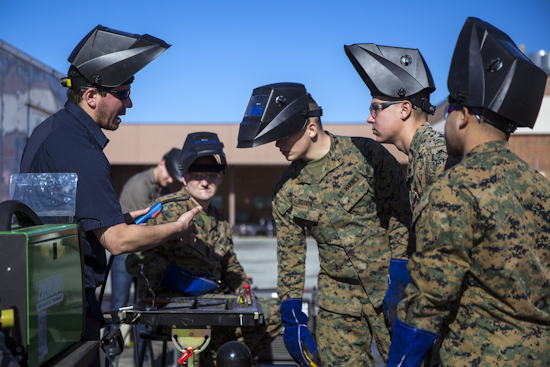
The Marine Corps is another branch that has welding jobs available in the military.
Often, welders are assigned the job rating Basic Metal Worker (MOS 1316).
However, the entire MOS 1300s job field is associated with construction and manufacturing jobs.
Therefore, Marines can find ways to become a welder in various military roles, including MOS 1316.
The Basic Metal Worker performs job functions similar to welders in other service branches.
However, Marine welders also focus on combat and amphibious operations, since most of their work is done in the field.
Consequently, those seeking to join the Marines must be calm working under pressure, and not afraid of combat situations.
Marine Support Welders provide an important role and function within the service branch.
And, like many other military welding jobs, it can open a door of possibilities in the civilian world after finishing your time in service.
#5. Navy Military Support Welder
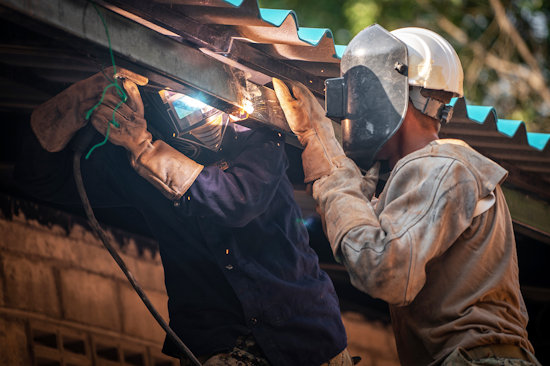
The United States Navy is another outstanding place to become a welder.
The service branch is always in need of construction and manufacturing, especially jobs like welders.
Navy welders operate on ships, and some even have underwater welding certifications.
So, there are many different pathways and opportunities to specialize within the service branch.
Navy Military Support Welders perform a variety of functions, including working as Steelworkers and Construction Mechanics.
Additionally, aspiring welders may also want to consider becoming a Hull Technician (HT).
The job requirements and training for each military rating depend on several factors, including education, qualifications, and training.
Related Article – 10 Best Navy Jobs For Civilian Life
FAQs (Frequently Asked Questions): Military Support Welder
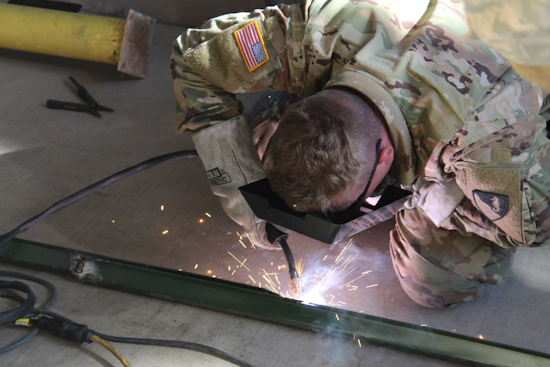
Are you interested in becoming a welder in the U.S. Armed Forces?
There are multiple welding jobs in the military and ways to specialize (aircraft, ships, submarines, etc.).
Here are some frequently asked questions regarding becoming a Military Support Welder:
Where can I find welding jobs in the military?
The U.S. Armed Forces hires Military Support Welders.
Currently, there are various roles available in the U.S. Army, Coast Guard, Air Force, Marine Corps, and Navy.
Military welders are responsible for performing various welding tasks, including repairing buildings and vehicles.
Welders in the military also operate on military aircraft, ships, and submarines.
What are the job duties of military welders?
Military Support Welders perform many different job functions.
The exact duties usually vary depending on the service branch and specific job role.
Be that as it may, here are a few common responsibilities of military welders:
- Weld, braze, solder, and heat-treat metals.
- Design, manufacture, and modify metals during construction and/or production.
- Solve fabrication, airframe, maintenance, and support equipment repair problems.
- Disassemble, assemble, or fit component parts using machine screws, bolts, rivets, press fits, and welding techniques.
- Use manual and computer numerically controlled (CNC) metalworking machines, mills, and lathes.
- Perform installation, operation, maintenance, and repair of metalworking and welding equipment and materials.
Military Support Welders must be able to read and analyze blueprints.
For this reason, it’s helpful to have previous welding experience and/or attend an apprenticeship or training program.
What are the job requirements for military welders?
There are a few basic requirements for becoming a Military Support Welder.
First, the individual must be at least 18 years old and have a high school diploma or GED equivalent.
Secondly, candidates must attain the minimum ASVAB scores for that specialty, which is determined by the individual service branch.
For example, the U.S. Army requires a minimum score of 88 in GM and 95 in GT, or a minimum of 98 in GT to qualify for training in MOS 91E.
Often, it helps to have previous welding experience or attended a training program. A sufficient amount of experience may substitute for Tech School or Advanced Individual Training.
However, most military welders complete their training through their branch’s formal education channels.
Eventually, military welders can earn certification from the American Welding Society (AWS).
What is the education and training for welding jobs in the military?
In general, service members must complete basic military training regardless of service branch.
Then, advanced training is usually a combination of classroom instruction and field exercises.
Welders learn more about sheet metal layout and ductwork.
Additionally, trainees develop procedures and techniques for cutting, brazing, and heat-treating metal.
Furthermore, welders learn the operation and care of welding, soldering, and brazing equipment.
Ideally, the candidate has already learned many of these skills as part of a welding program or apprenticeship.
However, all branches of the U.S. Armed Forces have training programs for welders and machinists.
Conclusion
There are many different welding jobs in the military.
The United States Air Force, Coast Guard, Army, Navy, and Marine Corps all employ welders.
Military Support Welders have different job functions and roles depending on the service branch and specialty.
Welders have the opportunity to develop job skills while working under pressure.
As such, many different employment opportunities are also available after completing your time in service.
- Ikon Pass Military Discount: Learn How To Save Big - January 31, 2025
- RTIC Military Discount: Find Out How To Save Big on Gear - January 30, 2025
- Traeger Military Discount: Learn How To Save Big on Smokers - January 28, 2025

